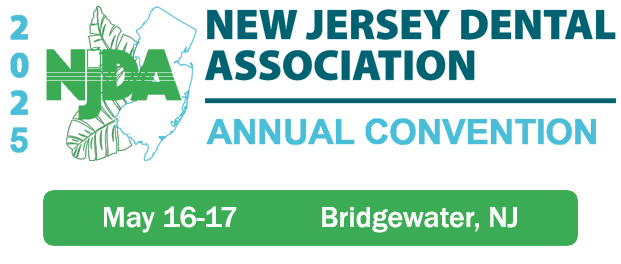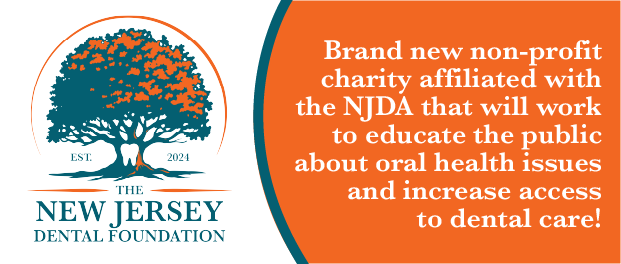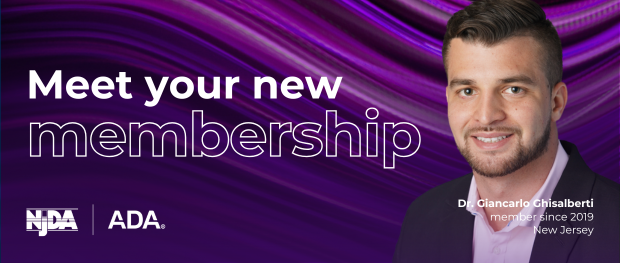Perfect Smiles Start With You
Smile Design Boot Camp is an intensive 4-day course that equips dentists with the confidence and knowledge to incorporate techniques for single-arch and full mouth rehabilitation into their practice. Sign up to secure a spot!
It's a NEW Convention!
Registration is now open for NJDA’s Annual Convention in Bridgewater on May 16-17! Our annual gathering of the NJ dental community will feature top-tier CE courses on a wide range of topics, a rooftop party, and more.
The Party of the Year!
The NDJA Celebration on May 16 is going to be huge! We are taking over the entire 7th floor of the AC Hotel including three bars, outside patio, pool table, DJ and dance floor!
New Jersey Dental Foundation
Take a moment to learn more about NJDA's brand new initiative to help the public learn more and gain access to oral healthcare! Read the mission statement, governance, structure and more.
This is membership your way
Renew today to explore new lower membership costs and customization offerings.
Helping Members Succeed
The New Jersey Dental Association is the voice of the dental profession and a strong proponent of oral health in the state. Members are part of a vibrant community of dentists encompassing 12 local dental societies as well as the American Dental Association. Members engage in educational programs, have access to dentist-centric relationships and tools to navigate the business of dentistry and their careers, as well as benefit from dedicated advocacy that protects the interests of the profession. The organization is run by member-dentists with the support of a team of professionals at NJDA Headquarters. NJDA members never practice alone!
UPCOMING EVENTS
DENTAL NEWS AND NOTES

Ensuring Ethical Dental Care: Obtaining legal Consent for Nonverbal Adults

When it comes to dental treatment, the importance of obtaining proper, legal consent cannot be overstated. Dentists often face unique challenges in obtaining consent to treat adults who are nonverbal or unable to provide consent on their own due to cognitive impairments or advanced age.
The Dentists Insurance Company Risk Management Advice Line, which provides guidance to TDIC policyholders and dental association members, regularly receives inquiries about the appropriate procedures for obtaining consent to treat adults with special needs. The following case study illustrates the need for compassionate care and vigilance to ensure valid consent is obtained.
A Case Study on Ethical Consent
An elderly patient presented to a dentist for a crown preparation. While the patient was in the operatory chair, a clinical staff member noticed that the patient had his shoes on the wrong feet. The staff member wisely decided to share this observation with the dentist. Upon further investigation, the dentist learned from his front desk staff that when the patient arrived for his appointment, he told them he had lost his phone and iPad.
Feeling concerned about the patient’s state of mind, the dentist opted to contact the patient’s wife prior to proceeding with the treatment. The patient’s wife was listed on the patient’s medical history form as the emergency contact. The dentist expressed concerns about the observations made in the office that day and asked if this had been an ongoing issue. The patient’s wife replied that she also had concerns for her spouse’s mental state, but also noted that the patient had refused to see his primary care physician. This conversation was both concerning and enlightening, signaling to the dentist that perhaps the patient was at risk of being unable to provide informed consent for the scheduled treatment.
Upon informing the patient that they would not be performing any treatment unless they were able to obtain consent, the patient requested to speak with the dentist privately. The patient shared that he’d been given a recent diagnosis of Alzheimer’s disease, which he did not want his wife to know about. He requested that the dental office not contact his wife in the future, as he felt any news of his progressing disease would be disturbing for his wife. The patient left the office, and staff could see he had trouble locating his vehicle in the office’s parking lot.
While the dentist felt confident that he had done the right thing by not proceeding with treatment, he was unsure about the ethics of honoring the patient’s wishes in the future. When the dentist reached out to TDIC’s Risk Management Advice Line, an analyst advised him to establish communication with the patient’s physician to seek advice on how to proceed. The analyst also provided the dentist with suggestions on how to effectively communicate with the patient’s physician to ensure patient safety.
Understanding Consent and Informed Consent
Consent is the act of voluntarily and knowingly agreeing to undergo a specific treatment or intervention. Informed consent goes a step further, encompassing the understanding of the risks, benefits, alternatives and potential consequences associated with the proposed treatment. While consent acknowledges the patient's willingness, informed consent recognizes the patient's right to make an autonomous decision based on complete and understandable information.
The Significance of Consent: Body Autonomy and Patient Rights
Consent is a fundamental aspect of ethical health care practice and is rooted in the principles of autonomy and patient rights. Respecting an individual's body autonomy means acknowledging their right to make decisions about their own health care, including the right to accept or refuse treatment. For nonverbal adults, ensuring consent is obtained upholds their dignity and recognizes their right to be fully involved in the decision-making process as much as possible.
Who Can Legally Provide Consent?
When adults are unable to provide consent themselves, it becomes necessary to identify who can legally act as their representative. The specific laws and regulations governing this may vary between jurisdictions. Generally, a legally authorized representative, such as a guardian, parent or health care proxy, can provide consent on behalf of the nonverbal adult. It is essential for dental professionals to familiarize themselves with local laws and procedures to ensure compliance and the protection of both the patient and the dental practice.
An Action Plan for Dental Practices
In the case study presented, the dentist and his staff members were already on the lookout for behaviors that signaled the possibility the patient may be impaired and unable to provide consent. They communicated their concerns and worked collectively as a team to mitigate the risk of unethical treatment.
Here are some ways to take action in the dental practice:
- Educate and train. All staff members, particularly those working in the clinical setting, should receive comprehensive training on the legal and ethical aspects of obtaining consent for nonverbal adults. This includes understanding local regulations, communication strategies and documentation requirements. Advice analysts recommend that dentists encourage their staff to follow the motto, “If you see something, say something.” If anyone on staff sees something unusual, they should document their findings in the chart and alert the dentist.
- Assess decision-making capacity. Dentists should assess the cognitive abilities and limitations of nonverbal adults to determine their decision-making capacity. Collaborate with speech therapists, social workers and other caregiving professionals who can provide valuable insights.
- Communication strategies. Adapt communication methods to suit the individual's unique needs. Utilize visual aids, written materials, pictures or sign language interpreters to facilitate understanding. Tailor information to the patient's comprehension level and preferences.
- Involve caregivers and advocates. Engage legally authorized representatives or caregivers in the consent process. Maintain open and ongoing communication to gather accurate and current medical histories, understand patient preferences and make decisions in the patient's best interest.
- Document consent procedures. Thoroughly document all consent-related procedures in the patient’s chart, according to dental office policy. This should include the method of obtaining consent, the date and time, individuals involved (including witnesses present), communication aids utilized and treatment details. Documentation serves as a record of compliance with legal and ethical standards. If staff finds that documentation has not been obtained from existing patients, arrange to review their records with patients and secure documentation going forward. Information and education may need to be provided to the authorized representatives, so they understand that this process of documentation is an important legal protection for both them and the provider.
- Periodic re-evaluation. Recognize that consent may be an ongoing process. Periodically re-evaluate the patient's decision-making capacity and adapt communication strategies accordingly. Seek input from caregivers and advocates to ensure decisions remain aligned with the patient's best interests. Check that records and information about those authorized to offer consent on the patient’s behalf are up to date prior to appointments.
Obtaining proper, legal consent for nonverbal adults is of paramount importance in the dental practice. It upholds the principles of patient autonomy and body autonomy, ensuring that even those unable to communicate verbally or provide consent themselves must have their rights respected. Establishing and securing appropriate documentation and authorizations ensures that dentists are protecting the rights of their patients and their practice. By becoming familiar with local laws, employing effective communication strategies, involving caregivers and advocate, and maintaining meticulous documentation, dentists can navigate this complex landscape and provide ethical and patient-centered care for a vulnerable population.
TDIC’s Risk Management Advice Line is available to answer any questions or concerns dentists may have about ethical treatment and patients with special needs.
For use by the California Dental Association components, the Arizona, Hawaii, Idaho, Nevada, New Jersey, North Dakota, Oregon, Pennsylvania and Washington dental associations, the Alaska Dental Society and the Illinois State Dental Society. If you wish to reprint this article, contact TDIC in advance by emailing info@tdicins.com. If you would like to request edits to this article prior to publishing, include the suggested changes in your email.
Contact Us
Phone: 732-821-9400 or dial the Staff Directly
Fax: 732-821-1082 | Email: info@njda.org | Follow us @NJDentalAssoc
One Dental Plaza, North Brunswick, NJ 08902













